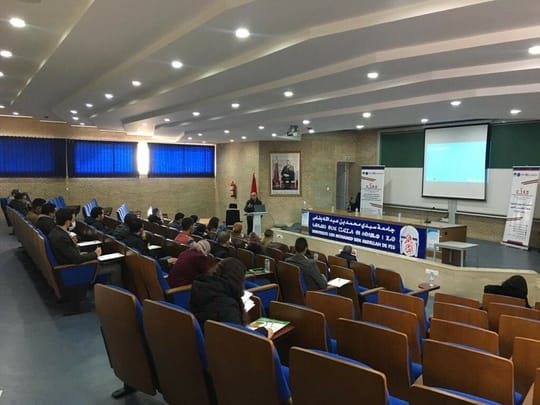Switching to a Sustainable and Circular Business Model | USMBA Legal Aid Clinic, Fes

On November 27, 2020 the Legal Clinic housed at University Sidi Mohamed Ben Abdellah’s Faculty of Economic and Social Legal Sciences in Fes (FSJES-USMBA) held a training on sustainable and circular business models. This is one of several trainings designed to strengthen the capacity of students who are preparing to become student clinicians.
In tandem with their university curriculum, these training sessions give students practical information that will be directly applied to their service delivery and other advocacy activities conducted within the legal clinic’s framework. Not only will underserved populations in the Fes-Meknes region be able to receive legal assistance at no charge, the students will be participating in a service learning experience that will be invaluable to them as they proceed toward their own career aspirations.
This training was conducted by Moustafa Ghalib, an expert in entrepreneurship, and a specialist at Anapec. This training built off of a previous training conducted by Mr. Ghalib, in which he discussed the concept of entrepreneurship and how it is applicable to not only the aspirations of the students, but also those who the clinicians will be serving. In this session, Mr. Ghalib focused on business models of a company, specifying the importance of sustainability, in particular “eco-innovation”, which consists of providing new solutions that allow a company to reduce its environmental impact.
Striving for sustainability
Mr. Ghalib explained the concept of “eco-design”, in which the life cycle of a product is continuous — when the life cycle of a product is endangered, the entrepreneur must incorporate sustainability in order to contribute to environmental preservation. Sustainable consumption is about improving the efficient use of resources throughout the life cycle of a product by emphasizing the role of businesses, supply chains, and individual consumers as actors in the development of a durable circular economy.
According to Mr. Ghalib, a circular economy aims to go beyond a linear economic model consisting of extracting, manufacturing, consuming, and discarding. It calls for a responsible consumption of natural resources and primary raw materials as well as the prevention of waste production. Mr. Ghalib then explained the concept of a lean startup, which refers to the idea that a business or activity is only likely to be successful if it gives itself the time to research the market before launching. A business model can be synthesized and described through a business model and its elements. One must understand the context — like everything else, a business is part of a system that does not operate independently; it is affected by political, economic, social, technological, environment and legal factors. An entrepreneur must anticipate opportunities and avoid potential threats caused by changes.
Analysis of objectives
Two other factors that must be considered in a successful business plan are objectives and indicators. These must be identified in a “green business” so that stakeholders can make choices that ultimately work towards achieving their objectives. Objectives must follow a SMART analysis:
S: Specific and simple
M: Measurable
A: Attainable
R: Relevant
T: Time-bound
This training session was one of several organized by the High Atlas Foundation that is designed to prepare students to become practitioners of pro bono legal aid to people in vulnerable situations in the Fes-Meknes region. Depending on the needs of the community, the clinicians may provide pro bono legal advice to those who are interested in starting their own business. Mr. Ghalib’s session on sustainable business models provides the students with valuable technical information that will enable them to better serve their clients. Students have also received training on topics including but not limited to migration, asylum, and participatory communication.
Learn more about how you can support the efforts of the Legal Aid Clinic here.
The High Atlas Foundation is working in partnership with the Faculty of Economic and Social Legal Sciences at the University Sidi Mohamed Ben Abdellah (USMBA) in Fes to operate and grow a Law Clinic and Legal Aid program which actively engages students in experiential and service learning for the benefit of marginalized communities in the Fes-Meknes region. The project is funded by the National Endowment for Democracy (NED) and the U.S.-Middle East Partnership Initiative (MEPI).